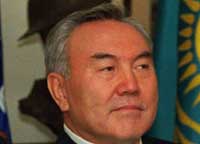EU says that Kazakh law could scare investors

The European Union warned Kazakhstan on Thursday that a new oil law allowing the energy-rich nation to break off contracts with foreign companies will scare investors, who need "a secure and predictable climate" for large energy projects.
Kazakh President Nursultan Nazarbayev has just signed a law that allows the government to review contracts with foreign companies if the country believes they go against its national interest.
However, he pledged earlier this month not to use the new powers to review a major oil development contract with an international consortium led by Italy's Eni SpA amid a dispute sparked by production delays.
But the EU executive said it is still concerned and would continue to talk to the Kazakhs about the rule changes.
"The new law gives Kazakhstan new powers to change contracts that have already been agreed," said EU energy spokesman Ferran Tarradellas Espuny.
The European Commission said it needed to see how the law would affect investments EU business have made in Kazakhstan and if it was in line with an international energy treaty that threatens existing contracts.
"In order to ensure that companies are willing to invest in large-scale energy projects, a secure and predictable investment climate is a key precondition," it said in a statement. "Successful energy partnerships with third countries should be based on mutual respect of transparency, predictability and nondiscrimination."
The ex-Soviet republic's government wants to renegotiate with the consortium the terms of the development of the massive Kashagan oil field in the northern Caspian Sea over delays in commercial production and cost overruns.
Kazakhstan's government in August suspended operations at Kashagan and warned that the state-run energy company Kazmunaigaz could increase its role in the project.
The Kashagan project is now scheduled to start commercial production in 2010, delayed from an original 2005 date. Kazakh officials also say Kashagan's total costs have jumped to US$136 billion (EUR96 billion) from an initial estimate of US$57 billion (EUR40 billion).
The development of the Kashagan field is at the core of Kazakhstan's strategic plan to triple its oil output by 2015 and become one of the world's top oil producers. The delays forced the country to downgrade its long-term output forecast last year from 3 million to 2.6 million barrels a day by 2015.
Eni estimates Kashagan, one of the biggest oil discoveries of the past 30 years, will produce 1.5 million barrels of oil a day at its peak output.
The Eni-led consortium also includes U.S.-based Exxon Mobil Corp. and ConocoPhillips, Royal Dutch Shell PLC, France's Total SA and Japan's Inpex Corp.
In the past few years, Kazakhstan - a vast country lying south of Russia and west of China - has been trying to increase state assets in its energy sector, which is currently dominated by Western investors.
Subscribe to Pravda.Ru Telegram channel, Facebook, RSS!


